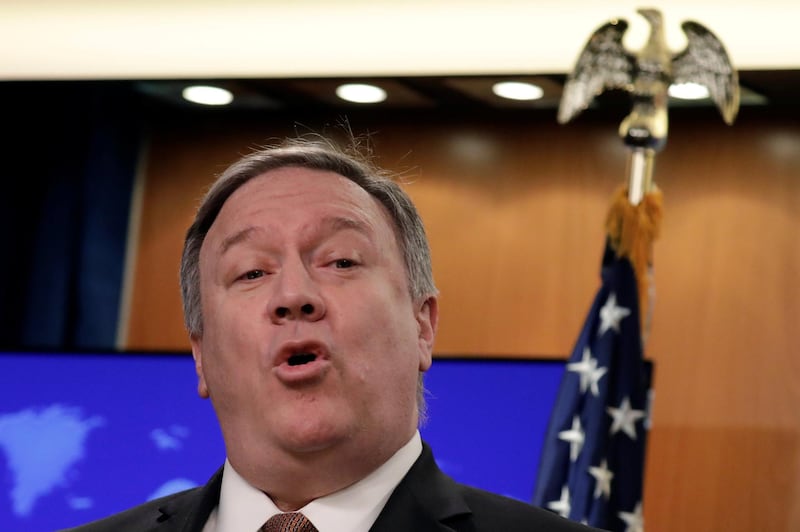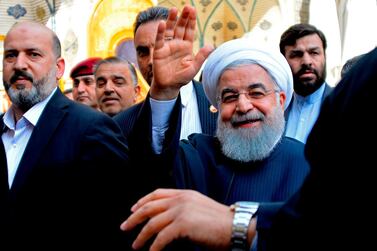On his first trip to Beirut this week, US Secretary of State Mike Pompeo will be walking a fine line between continuing support for Lebanon’s institutions while waving the threat of sanctions if evidence emerges that their funds are being diverted to militant group Hezbollah.
Mr Pompeo, who leaves on Tuesday for a four-day-trip to the Middle East, is expected to arrive in Lebanon on Saturday after visiting Kuwait and Israel.
His predecessor Rex Tillerson was criticised when he visited Beirut early last year where he was seen to be kept waiting by the Lebanese President Michel Aoun.
But, with a new government in Lebanon, and with both US diplomats David Satterfield and David Hale visiting Beirut in the last two months to prepare for this visit, Mr Pompeo is expected to receive a prominent reception.
His meetings are scheduled to include President Aoun, Prime Minister Saad Hariri, Speaker of the House Nabih Berri and his counterpart Gebran Bassil.
A senior US official briefing reporters said Mr Pompeo will be discussing the “illicit activities and threatening behaviours” of Iran and Hezbollah.
The US is planning to continue its annual aid for Lebanon’s armed forces (an estimated $70 million) “as the legitimate defenders of the state stand in stark contrast to…Hezbollah and the Iranian Revolutionary Guard Corps’ presence in Lebanon,” he added.
One message that Mr Pompeo will deliver to his Lebanese hosts will be a warning over any government funds reaching Hezbollah.
The Iranian-backed party now holds three seats in the new Lebanese Government, including the health ministry.
The US official made it clear that Washington has “outlined our concerns about potential Hezbollah access to Lebanese state funds or, beyond that, to funds from the international community, including the United States, provided through any institution of the Lebanese state”.
The US designated Hezbollah as a foreign terrorist organisation in 1997.
“We are watching this and we have been absolutely transparent on this point very, very closely. It is not just that we are required by statute to act if there is any credible indication of misdirection, appropriation of funds. It is part of our policy as well,” the official said.
But one issue that the Trump administration is hoping to make progress on is the maritime border dispute between Lebanon and Israel over oil and gas exploration. Mr Satterfield has been mediating between Beirut and Tel Aviv for over a year to find an working formula on this issue, and the areas in question.
“The United States stands ready…to facilitate discussions between the governments of Lebanon and Israel for a resolution to mutual benefit of the dispute involving potential offshore resources,” the US official said. “The rest of the Eastern Med is moving forward in exploring and exploiting for the benefit of their people – Greece, Cyprus, Turkey, Egypt, Israel – those resources.”
Hanin Ghaddar, a fellow at the Washington Institute for Near East Policy who focuses on Lebanon and Hezbollah, expected the maritime border issue to top Mr Pompeo's agenda in Beirut. She told The National that Mr Satterfield discussed the dispute on his visit to Beirut this month, and an agreement on bloc 9 could be spurring Mr Pompeo's shuttle diplomacy between Israel and Lebanon.
On the issue of sanctions, Ms Ghaddar, who has recently written a paper on how those financial screws are hurting Hezbollah, said Mr Pompeo is likely to “warn the Lebanese government of Hezbollah’s increased sway inside the Lebanese state”.
She added: “The US has already warned Lebanon that if Hezbollah receives funds from government institutions, such as the health ministry, the US will sanction these institutions.”
Hezbollah now controls ministries of health, sports and parliamentary affairs. Its leader Hassan Nasrallah urged his supporters last week to fundraise money as a way to alleviate pressure from the financial sanctions. Ms Ghaddar argued that “Hezbollah will unlikely divert state funds to their institutions and lose that leverage [if they get caught], and instead, they are more likely to use the state’s funds to serve their constituents, as an alternative to their social services.”
Mr Pompeo will be coming to Lebanon after visiting Kuwait and Israel. In Kuwait, he will chair the bilateral strategic dialogue, and discuss defence relations and regional security. The timing of his visit to Israel, however, three weeks before the elections is raising eyebrows.
"Traveling to Israel on the eve of their early April elections will certainly be exploited by Prime Minister Bibi Netanyahu as signifying US backing for his re-election," Robert Danin, former senior State Department official and senior fellow at Harvard's Belfer Center, told The National.
“Given President Trump’s high approval rating in Israel, his perceived support for Bibi Netanyahu will be significant,” he said. But as far as the peace process is concerned, Mr Danin did not expect much movement from Mr Pompeo’s trip, and worried it may backfire.
“Mike Pompeo’s visit to Israel without any side trip to Ramallah [the headquarters of the Palestinian Authority] will also hurt any administration effort to get Palestinian support for the imminent rollout of Trump’s peace plan,” the former official said.
The Israeli prime minister will also visit Washington in two weeks and meet US President Donald Trump.






